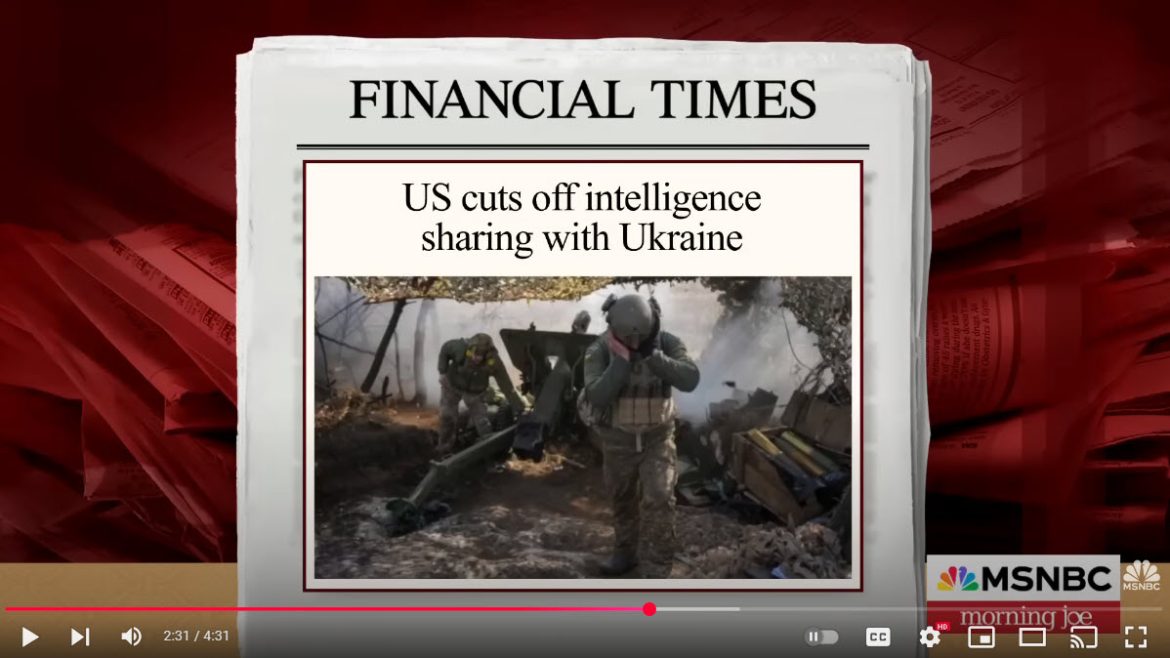The United States has temporarily halted intelligence sharing with Ukraine following a tense Oval Office meeting last week between President Donald Trump and Ukrainian President Volodymyr Zelensky. National Security Adviser Mike Waltz confirms the decision, stating that ongoing diplomatic discussions are progressing and that movement on the matter is expected soon.
This pause in intelligence cooperation follows the Trump administration’s decision on Monday to freeze military aid to Ukraine, raising concerns about the future of U.S.-Ukraine relations. The move marks a significant shift in the Biden-era policy of unwavering support for Ukraine, reflecting Trump’s continued emphasis on reevaluating foreign aid commitments and military engagements.
According to sources within the administration, the decision to halt intelligence sharing stems from broader discussions about the conditions under which the U.S. will continue to support Ukraine. President Trump has expressed skepticism over continued military and financial assistance to Kyiv, citing concerns about accountability and the effectiveness of U.S. aid in resolving the ongoing conflict with Russia.
During their meeting, Zelensky urged Trump to maintain military support, arguing that withholding assistance could embolden Russia and weaken Ukraine’s defensive capabilities. However, Trump reportedly remained firm on his position that Ukraine should assume greater responsibility for its defense and seek diplomatic solutions to the conflict. The discussion, described as tense by those present, highlighted deep differences in approach between the two leaders.
Despite the pause in intelligence sharing, Waltz reassures that negotiations with Ukrainian officials are making progress. He emphasizes that the administration is working toward a resolution and expects movement “in very short order.” However, no specific timeline has been provided, leaving Ukrainian officials uncertain about when and if intelligence cooperation will resume.
The intelligence-sharing pause comes at a critical moment in the Ukraine-Russia conflict, as Kyiv relies heavily on real-time intelligence from the U.S. to counter Russian military operations. Analysts warn that any disruption in this flow of information could leave Ukraine vulnerable to surprise attacks and weaken its strategic planning. Military experts also caution that suspending intelligence sharing could signal wavering U.S. support, potentially altering the geopolitical landscape and impacting NATO’s approach to the war.
Meanwhile, reaction to the decision has been swift. Republican lawmakers aligned with Trump defend the move, arguing that U.S. resources should be prioritized for domestic concerns. They contend that Europe should take a larger role in aiding Ukraine and reducing reliance on American intelligence. Conversely, Democratic leaders and foreign policy analysts criticize the decision, warning that it could jeopardize Ukraine’s ability to defend itself and embolden Russian President Vladimir Putin.
Internationally, NATO allies are closely monitoring the situation, with concerns that reduced U.S. support could undermine broader Western efforts to assist Ukraine. European leaders have privately expressed frustration over the shift in U.S. policy, with some warning that it could weaken deterrence against Russian aggression.
As diplomatic talks continue, all eyes remain on the White House for further clarification on the administration’s stance. While Waltz assures that discussions with Ukrainian officials are productive, the uncertainty surrounding the intelligence-sharing pause adds another layer of complexity to an already volatile conflict. The coming days will be crucial in determining whether the U.S. resumes intelligence cooperation or whether this move signals a long-term recalibration of U.S. policy toward Ukraine.
Source Links:
- U.S. Pauses Intelligence Sharing with Ukraine – YouTube
- Mike Waltz on Ukraine Negotiations – YouTube
- Trump Freezes Military Aid to Ukraine
- White House Considers Cutting Ukraine Intelligence Support
- Ukraine Struggles Amid U.S. Policy Shift
- NATO Leaders React to U.S. Decision on Ukraine



